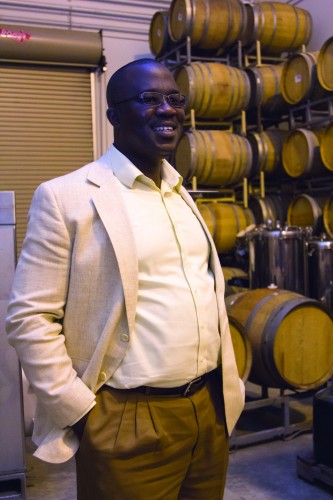George Sellu
MA ’05, PhD ’14
Growing Lifelong Learners
“You’ll never meet anyone who’s not concerned about food in one way or another,” said George Sellu (MA ’05, PhD ’14). “It’s a topic students always connect with, no matter what field they’re studying. In Ag Ed, we can integrate concepts from business, health, math, economics, the environment—it makes the learning easier.”
Sellu is a tenure-track faculty member in Agriculture and Natural Resources at Santa Rosa Junior College. From where he stands, Ag Ed is a natural medium for getting students excited about topics that they might otherwise find intimidating or dull. A case in point: his soil science class, which includes learning activities at the college’s Shone Farm, a 365-acre outdoor laboratory that includes forest, pasture, vineyards, a variety of field crops, olives and apples. Students who shy away from science classes can’t help but get engaged by the hands-on approach.
“We go out to the farm and collect soil samples from the vineyard, pasture and garden area,” said Sellu. “Then we analyze them to determine soil properties and ask students to describe the agronomic practices the soil requires based on the results of the analysis. That type of learning is not going to happen for students who are just sitting through a traditional classroom lecture. Shone Farm offers us the opportunity to apply classroom content in real-world field situations.”
At Santa Rosa Junior College, Sellu is doing all he can to expand agriculture opportunities for students. He revamped the college’s degree and certificate AgriBusiness program and has applied for it to be a Transfer Model Curriculum for the CSU system. Students who complete an associate’s degree at the college can then transfer as juniors to any CSU that confers an AgriBusiness degree.
Connecting the Classroom with AgriBusiness
The program includes the kind of flexibility needed by working students, especially those already employed in agriculture. “We offer a hybrid class format,” said Sellu. “It begins with instruction, videos, online discussion forums and virtual office hours, and then alternates between field trips and class sessions for the remaining weeks.”
The hallmark of Sellu’s approach is real-world experiences, and that extends into his AgriBusiness classes. “We visit different agricultural businesses,” he said, “such as a CSA run by people who started as workers and ended up buying the business.” Sellu’s students also meet with struggling business owners to learn about the challenges of running an ag-based business.
After developing business plans in class, some of Sellu’s students have launched their own businesses, including one who is a wine broker and another who co-founded Sonoma Hot Sauce. Many continue to come back for advice—and as guest speakers in ag classes—after graduating. “It’s very powerful for the students to see former students’ real-world successes,” Sellu said.
Sellu has embraced the School of Education’s emphasis on continued learning. “I want to get more people to approach learning that way,” he said. “It should be an ongoing, lifelong process. That’s something I truly believe in.”
That perspective serves him well in an ever-changing field. “Agriculture is evolving,” said Sellu. “We farm differently today than 20 years ago, or even five years ago, and the application of scientific principles in agriculture is changing so rapidly that your learning cannot be static. I liken it to a computer software application that is updated frequently—you must keep up with changes in technological and engineering processes in order to stay competitive. There’s never a dull moment.”
Diversifying the Discipline
Agricultural education is a collaborative discipline, and Sellu’s position as the only African-American Ag Ed teacher in California left him isolated at first. “I’d be at a conference with 500 peers and no one would talk to me,” he said. “I heard some really insensitive comments, but the School of Education faculty stood up for me and helped me navigate the system. If it wasn’t for that, I might have quit.”
Sellu is working to bring more people of color into the field. “Forty or fifty years ago, women were excluded from Ag Ed,” he said. “That’s changed, and now we need more people of color. I want my students to know that it’s okay to be involved in ag if you’re African-American, Native American or Latino/a. It’s okay to be a child of a farmworker and grow up to be a farm owner. They need to know that this is something we can achieve.”









